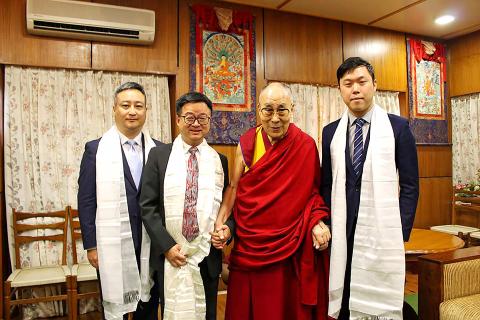Top Democratic Progressive Party (DPP) officials during a visit with the Dalai Lama in Dharamsala, India, vowed to forge closer cooperation with the exiled Tibetan government and to form an international “Silk Road of Democracy” (民主絲路) to fight Chinese oppression.
A direct channel has been established with the Dalai Lama after their fruitful talks from Wednesday to Friday last week, which focused on the strength of Taiwan’s democracy and protests in Hong Kong, DPP Secretary-General Luo Wen-jia (羅文嘉) said yesterday.
Luo was accompanied by party spokesman Lii Wen (李問) and public relations director Hsieh Yu-li (謝雨利) for their meeting with the Dalai Lama and officials from the exiled Tibetan government.

Photo from Lii Wen’s Facebook via CNA
“Taiwan’s main strength lies in its democracy,” Luo quoted the Tibetan spiritual leader as saying.
Although it is threatened by Chinese missiles and other intimidation tactics, “Taiwan’s strongest countermeasures include democracy, freedom and the comprehensive preservation of traditional culture,” Luo added.
Taiwan would build a broad international alliance that brings together Tibetans, Uighurs, Hong Kongers, Inner Mongolians and overseas Chinese democracy advocates to promote freedom, human rights and democratic values in China, Lii said.
The project would be called the “Silk Road of Democracy” to counter China’s Belt and Road Initiative, Lii said.
“The DPP and Tibetans share much of the same values and stand together under the same threatening force. Therefore, we shall forge a network with Tibetans, Uighurs, Hong Kongers and Inner Mongolians to pursue and consolidate democracy,” Luo said.
Asked whether there are plans to invite the Dalai Lama to Taiwan, Luo said that while he was representing the DPP and not the government on the trip, Taiwan is a free nation and the door is always open for people who seek freedom and democracy.
He said that the DPP welcomes the exiled Tibetan leader, who has not visited Taiwan since 2009.
“It is up to the willingness of His Holiness the Dalai Lama,” Luo added. “He has fond memories of his previous trips, but he said that his advanced age is not suitable for taking long flights.”
The DPP entourage also met with other key officials, including exiled Tibetan Prime Minister Lobsang Sangay, Legislative Speaker Pema Jungney, Secretary for Foreign Affairs Sonam Norbu Dagpo and Tibetan Youth Congress president Gonpo Dhondup.
Luo quoted the Dalai Lama as saying that he had not ruled out Taiwan as a location for his reincarnation, since it would take place in a Buddhist country.
Human Rights Network for Tibet and Taiwan president Tashi Tsering conferred hada, traditional Tibetan silk scarfs, on Luo, Lii and DPP Deputy Secretary-General Lin Fei-fan (林飛帆) to thank them for the party’s efforts in helping him obtain Republic of China citizenship.
As an exile, he has never seen his Tibetan homeland and has lived in Taiwan for 21 years, Tashi said.

CHAOS: Iranians took to the streets playing celebratory music after reports of Khamenei’s death on Saturday, while mourners also gathered in Tehran yesterday Iranian Supreme Leader Ayatollah Ali Khamenei was killed in a major attack on Iran launched by Israel and the US, throwing the future of the Islamic republic into doubt and raising the risk of regional instability. Iranian state television and the state-run IRNA news agency announced the 86-year-old’s death early yesterday. US President Donald Trump said it gave Iranians their “greatest chance” to “take back” their country. The announcements came after a joint US and Israeli aerial bombardment that targeted Iranian military and governmental sites. Trump said the “heavy and pinpoint bombing” would continue through the week or as long

TRUST: The KMT said it respected the US’ timing and considerations, and hoped it would continue to honor its commitments to helping Taiwan bolster its defenses and deterrence US President Donald Trump is delaying a multibillion-dollar arms sale to Taiwan to ensure his visit to Beijing is successful, a New York Times report said. The weapons sales package has stalled in the US Department of State, the report said, citing US officials it did not identify. The White House has told agencies not to push forward ahead of Trump’s meeting with Chinese President Xi Jinping (習近平), it said. The two last month held a phone call to discuss trade and geopolitical flashpoints ahead of the summit. Xi raised the Taiwan issue and urged the US to handle arms sales to

BIG SPENDERS: Foreign investors bought the most Taiwan equities since 2005, signaling confidence that an AI boom would continue to benefit chipmakers Taiwan Semiconductor Manufacturing Co’s (TSMC, 台積電) market capitalization swelled to US$2 trillion for the first time following a 4.25 percent rally in its American depositary receipts (ADR) overnight, putting the world’s biggest contract chipmaker sixth on the list of the world’s biggest companies by market capitalization, just behind Amazon.com Inc. The site CompaniesMarketcap.com ranked TSMC ahead of Saudi Aramco and Meta Platforms Inc. The Taiwanese company’s ADRs on Tuesday surged to US$385.75 on the New York Stock Exchange, as strong demand for artificial intelligence (AI) applications led to chip supply constraints and boost revenue growth to record-breaking levels. Each TSMC ADR represents

State-run CPC Corp, Taiwan (CPC, 台灣中油) yesterday said that it had confirmed on Saturday night with its liquefied natural gas (LNG) and crude oil suppliers that shipments are proceeding as scheduled and that domestic supplies remain unaffected. The CPC yesterday announced the gasoline and diesel prices will rise by NT$0.2 and NT$0.4 per liter, respectively, starting Monday, citing Middle East tensions and blizzards in the eastern United States. CPC also iterated it has been reducing the proportion of crude oil imports from the Middle East and diversifying its supply sources in the past few years in response to geopolitical risks, expanding